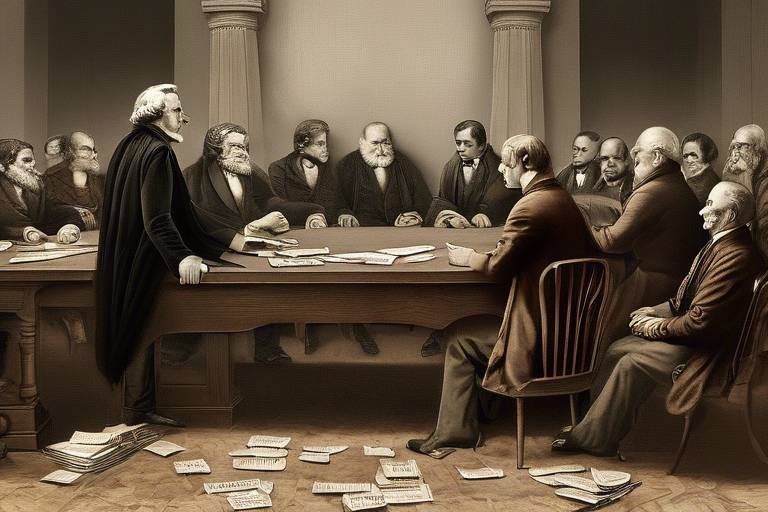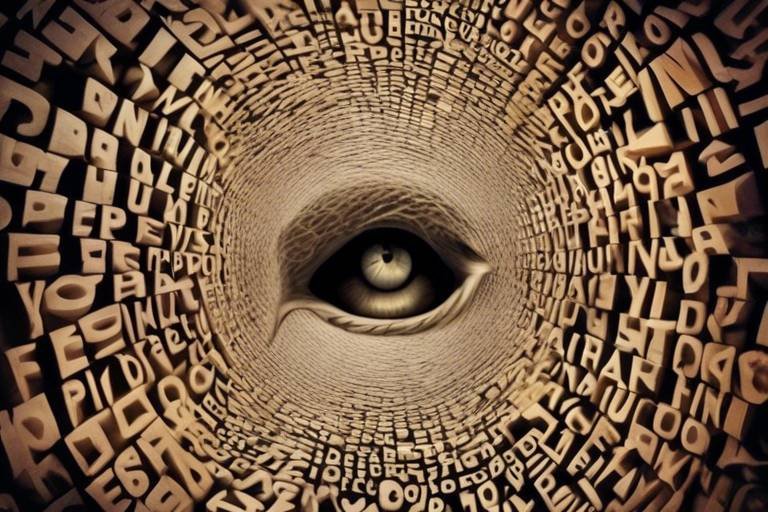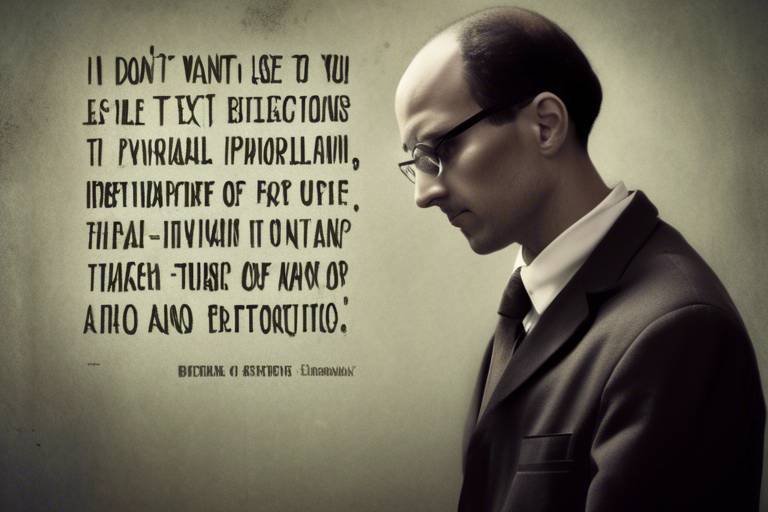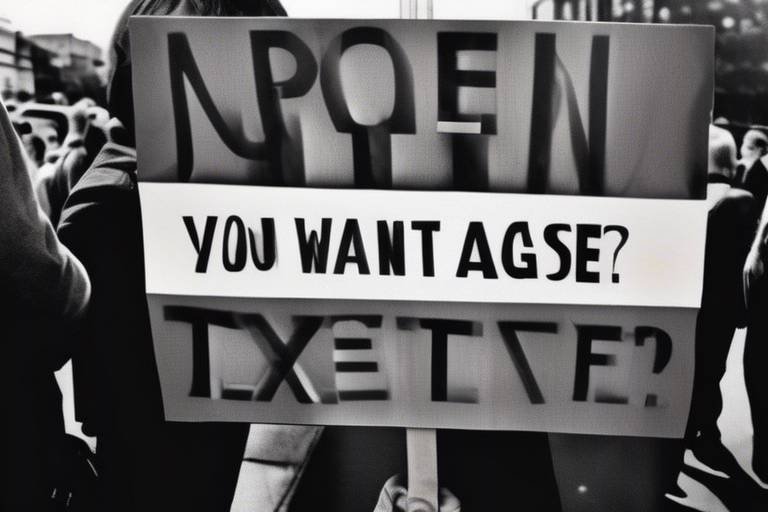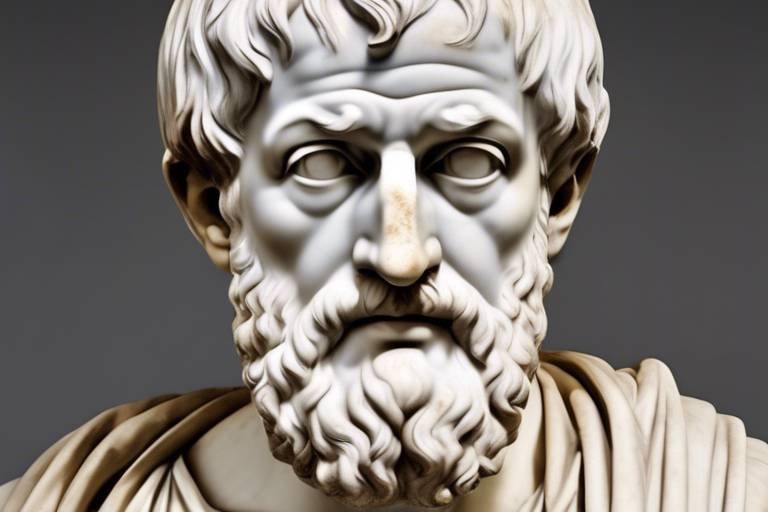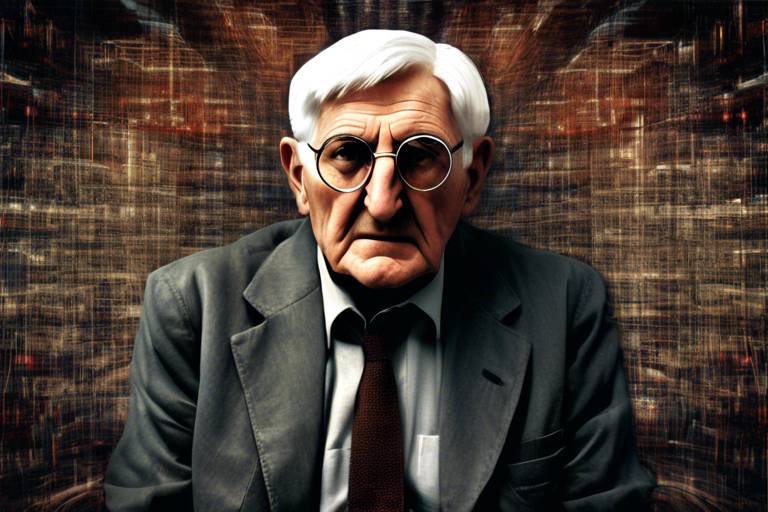The Problem of Free Will - A Philosopher's Perspective
The concept of free will is one of the most debated topics in philosophy, stirring up passionate discussions among scholars, thinkers, and everyday people alike. What does it really mean to have free will? Are our choices genuinely ours, or are they predetermined by a myriad of factors beyond our control? These questions not only challenge our understanding of human agency but also shake the very foundations of our moral and ethical beliefs. In this article, we will embark on a journey through the intricate landscape of free will, exploring how it intertwines with concepts like morality, determinism, and personal responsibility.
At its core, the debate around free will revolves around the tension between two opposing views: determinism and the belief in free will itself. Determinism posits that every event or action, including human decisions, is the result of preceding events in accordance with the laws of nature. This perspective raises a provocative question: if everything is predetermined, do we truly have the ability to choose? On the other hand, the belief in free will suggests that we possess the capacity to make choices independent of external influences. This dichotomy is not just an academic exercise; it has real-world implications that affect our legal systems, moral judgments, and how we perceive ourselves as individuals.
Many philosophers have weighed in on this debate, each bringing their unique perspectives to the table. Some argue that free will is an illusion, while others firmly defend the notion that we are the architects of our own destinies. Imagine you are at a crossroads, faced with a decision. Do you feel empowered to choose your path, or do you sense that your options are merely an illusion crafted by your circumstances? This metaphor encapsulates the essence of the free will debate—an ongoing struggle to understand the nature of choice and responsibility.
As we delve deeper, we will explore the role of neuroscience in this discussion. Recent advancements in brain research have provided fascinating insights into how our brains make decisions. Are we simply biological machines responding to stimuli, or do we have the capacity for autonomous choice? This inquiry leads us to examine case studies in neuroscience, where experiments have shown that our brains may initiate decisions before we are even consciously aware of them. This revelation has sparked intense debates about the existence of free will and what it means for personal accountability.
In contrast, the libertarian perspective on free will argues for the existence of genuine choice and moral responsibility. Libertarians believe that individuals are free to make choices that are not entirely dictated by prior states of the world. This viewpoint raises questions about ethics and accountability: if we are free to choose, then we must also be responsible for the consequences of those choices. But how does this notion hold up against the backdrop of determinism?
To bridge the divide between determinism and free will, the concept of compatibilism emerges. Compatibilists argue that free will can coexist with determinism, suggesting that freedom should be redefined in a way that acknowledges the deterministic nature of the universe while still allowing for personal agency. This perspective challenges us to think about freedom not as the absence of constraints, but as the ability to act in accordance with one’s desires and motivations, even if those are shaped by prior events.
As we navigate through these philosophical waters, we will also highlight key thinkers in compatibilism and their contributions to the discourse. These philosophers have provided compelling arguments that have influenced contemporary discussions on free will. However, compatibilism is not without its critics. We will examine the critiques faced by this perspective, addressing whether it genuinely reconciles free will with determinism or merely redefines the terms to suit its agenda.
- What is free will? Free will is the ability to make choices that are not determined by prior causes or divine intervention.
- What is determinism? Determinism is the philosophical belief that all events, including human actions, are determined by preceding events in accordance with the laws of nature.
- What is compatibilism? Compatibilism is the view that free will and determinism can coexist, suggesting that freedom is about acting according to one's motivations and desires.
- How does neuroscience affect the debate on free will? Neuroscience has shown that brain activity can precede conscious decision-making, raising questions about the autonomy of our choices.

The Historical Context of Free Will
Understanding the concept of free will is like peeling back the layers of an intricate onion, revealing the thoughts and beliefs of countless philosophers and cultures throughout history. From the ancient Greeks to modern thinkers, the debate over whether we truly have the ability to make choices has shaped our understanding of morality, ethics, and human agency. In ancient times, philosophers like Socrates and Plato pondered the nature of decision-making, often linking it to the pursuit of virtue and the good life. They believed that true knowledge would lead to virtuous choices, implying that free will is intertwined with our understanding of right and wrong.
Fast forward to the Middle Ages, where figures like Augustine of Hippo introduced the idea of divine foreknowledge. Augustine argued that although God knows everything, humans still possess the ability to choose freely. This notion created a fascinating tension between divine omniscience and human autonomy, suggesting that free will is essential for moral responsibility. It raises the question: if God knows our choices before we make them, how can we be truly free?
As we entered the Enlightenment era, thinkers like René Descartes and John Locke expanded on these ideas, emphasizing reason and individualism. Descartes famously declared, "I think, therefore I am," highlighting the centrality of self-awareness in the discussion of free will. Locke, on the other hand, focused on the concept of personal identity and how our experiences shape our choices. He argued that our decisions are influenced by our perceptions and reflections, suggesting that free will is not merely about making choices but understanding the context of those choices.
In the 19th century, the landscape shifted dramatically with the rise of determinism. Thinkers like Baruch Spinoza and later, Friedrich Nietzsche, challenged the traditional views of free will by positing that every event, including human actions, is determined by preceding causes. This perspective sparked a revolution in how we view human behavior, suggesting that our choices might not be as autonomous as we believe. The implications of this shift are profound, as it raises questions about moral accountability and the essence of human agency.
Today, the conversation around free will continues to evolve, especially with the advent of neuroscience. As we delve deeper into the workings of the brain, we find that our understanding of decision-making processes is becoming increasingly complex. The interplay between historical philosophical thought and modern scientific inquiry creates a rich tapestry of ideas that challenge our perceptions of freedom and choice.
In summary, the historical context of free will is a fascinating journey through time, filled with diverse perspectives and evolving ideas. Each philosophical movement has contributed to our understanding, shaping the discourse around morality, ethics, and human agency. As we continue to explore this profound topic, we must grapple with the implications of our findings, both ancient and modern, as they inform our understanding of what it means to be human.
- What is free will? Free will is the ability to make choices that are not predetermined by past events or divine intervention.
- How has the concept of free will evolved over time? The concept has evolved from ancient philosophy, through the Middle Ages, to modern discussions influenced by neuroscience and determinism.
- What are the implications of free will on morality? The belief in free will is often tied to moral responsibility; if our choices are determined, it raises questions about accountability.
- Can free will coexist with determinism? Some philosophers argue for compatibilism, suggesting that free will and determinism can coexist in a meaningful way.

Determinism vs. Free Will
The debate between determinism and free will is one of the most captivating discussions in philosophy. At its core, determinism posits that every event, including human actions, is the result of preceding events and natural laws. Imagine a giant domino effect where one action inevitably leads to another, forming an unbreakable chain of causation. In contrast, the belief in free will suggests that individuals have the power to make choices independent of past events or external influences. This dichotomy raises profound questions: Are we merely puppets dancing to the strings of fate, or do we hold the reins of our own destinies?
To better understand this clash, let’s break down the key components of both perspectives. Determinism argues that our choices are predetermined by a combination of genetics, environment, and prior experiences. For instance, if someone grows up in a particular socio-economic background, their choices might be heavily influenced by that context. On the other hand, proponents of free will argue that humans possess the ability to act contrary to these influences, suggesting that we can rise above our circumstances and make decisions based on personal values and beliefs.
Here’s a simple table to illustrate the fundamental differences:
| Aspect | Determinism | Free Will |
|---|---|---|
| Definition | All events are determined by preceding causes. | Individuals can make choices independent of past events. |
| Human Agency | Limited; choices are influenced by external factors. | High; individuals are responsible for their actions. |
| Moral Responsibility | Questionable; if choices are predetermined, can one be held accountable? | Clear; individuals are accountable for their decisions. |
This tension between determinism and free will also extends into our understanding of morality. If we are simply products of our environment, can we truly be held accountable for our actions? This question becomes even more pressing in the context of criminal behavior, where a deterministic view might suggest a lack of culpability. Conversely, if we accept free will, we must grapple with the implications of moral responsibility, which could lead to a more punitive society.
Moreover, this debate is not just academic; it permeates our everyday lives. Think about the last time you faced a tough decision. Did you feel like you were making a choice based on your own desires, or did you sense the weight of external pressures guiding your decision? These moments highlight the ongoing struggle between our innate sense of autonomy and the reality of our circumstances.
As we navigate this complex landscape, it’s essential to recognize that the conversation surrounding determinism and free will is far from settled. Philosophers continue to dissect these concepts, exploring nuances and implications. What if, instead of viewing them as opposing forces, we considered how they might coexist? This idea leads us to the next significant perspective in our exploration: compatibilism, which suggests that free will and determinism can harmoniously coexist. But that’s a discussion for another time!
- What is determinism? Determinism is the philosophical idea that all events, including human actions, are determined by preceding causes.
- Can free will and determinism coexist? Yes, compatibilism argues that both can exist together, allowing for a nuanced understanding of human agency.
- How does this debate affect moral responsibility? The belief in free will often underpins the idea of moral responsibility, while determinism raises questions about accountability.

The Role of Neuroscience
Neuroscience has emerged as a pivotal player in the ongoing debate about free will, challenging our traditional notions of autonomy and decision-making. With the advent of advanced imaging technologies, scientists can now observe the brain in action, shedding light on the complex processes that underlie our choices. This has raised some intriguing questions: Are we truly the architects of our decisions, or are our choices predetermined by the intricate wiring of our brains? To put it simply, if our decisions are merely the result of neural activity, where does that leave the concept of free will?
At the heart of this discussion is the idea that our brains are not just passive recipients of information but active processors that shape our thoughts and behaviors. For instance, studies have shown that brain activity can predict a person's decision several seconds before they consciously make that choice. This phenomenon suggests that what we perceive as a conscious decision might actually be the culmination of unconscious processes. Imagine a puppet show where the puppets believe they are performing freely, but in reality, they are being controlled from behind the scenes—this is akin to how our brains might operate.
Moreover, neuroscience has introduced the concept of neural determinism, which posits that our thoughts and actions are ultimately the result of biological processes. This perspective can be unsettling, as it implies a lack of control over our actions. However, it's essential to recognize that while our brains influence our decisions, they do not completely strip us of agency. The interplay between our biological makeup and our experiences creates a complex tapestry of influences that shape our choices.
To further illustrate this point, consider the following key findings from neuroscience that have sparked debates about free will:
- Libet's Experiment: In a famous study conducted by Benjamin Libet, participants were asked to make a spontaneous decision to move their wrist while their brain activity was monitored. The results indicated that brain activity related to the movement occurred before participants were consciously aware of their decision, suggesting that the brain initiates action before we even realize it.
- Functional MRI Studies: Functional MRI (fMRI) scans have shown that specific patterns of brain activity can predict choices before individuals are aware of them. This raises questions about the extent to which our decisions are truly conscious.
- Neurotransmitters and Decision-Making: The role of neurotransmitters, such as dopamine, in influencing our choices has also been explored. Changes in neurotransmitter levels can affect our motivation and decision-making processes, further complicating the traditional view of free will.
As we delve deeper into the implications of these findings, it becomes clear that the relationship between neuroscience and free will is not straightforward. While some argue that neuroscience undermines the very foundation of free will, others contend that it enriches our understanding of human behavior. The challenge lies in reconciling the scientific evidence with our intuitive sense of agency. Can we embrace the idea that our choices are influenced by both biological and environmental factors while still holding ourselves accountable for our actions? This is the crux of the debate that continues to evolve as neuroscience progresses.
In conclusion, the role of neuroscience in the discussion of free will is both fascinating and complex. As we uncover more about the brain's inner workings, we must grapple with the implications of these discoveries. Are we merely products of our neural circuitry, or do we possess the ability to transcend these biological limits? The answers may not be clear-cut, but they undoubtedly prompt us to rethink our understanding of human agency.
- What is the main argument against free will from a neuroscience perspective? Neuroscience suggests that many decisions are made unconsciously before we are aware of them, challenging the idea of conscious choice.
- How do neuroscientific findings impact moral responsibility? If our choices are influenced by brain activity beyond our control, it raises questions about whether we can be held morally accountable for our actions.
- Can free will and determinism coexist? Some philosophers argue for compatibilism, which suggests that free will can exist within a deterministic framework, allowing for moral responsibility despite biological influences.

Case Studies in Neuroscience
The exploration of free will has taken a fascinating turn with the advent of neuroscience, prompting researchers to delve deeper into the mechanisms of decision-making in the human brain. One of the most notable case studies comes from the work of Benjamin Libet, who conducted experiments in the 1980s that have since become a cornerstone in the debate surrounding free will. In his study, Libet measured the brain activity of participants as they made spontaneous decisions to move their fingers. What he discovered was astonishing: brain activity indicating a decision to move occurred several hundred milliseconds before participants were consciously aware of their decision. This finding raises profound questions about the nature of free will. If our brains are 'deciding' before we are even aware of it, what does that mean for our sense of agency?
Another compelling case study is the research conducted by John-Dylan Haynes and his team, who employed functional magnetic resonance imaging (fMRI) to predict participants' decisions up to ten seconds before they consciously made them. Their results suggested that neural patterns could forecast choices, indicating that our brains might be operating on autopilot, making decisions before we even realize it. This brings to light the idea that our perception of making a choice might be an illusion, a mere after-the-fact rationalization of what our brains have already decided.
These studies not only challenge our understanding of free will but also have significant implications for morality and personal responsibility. If our decisions are predetermined by neural activity, can we truly hold individuals accountable for their actions? The implications extend beyond philosophical musings; they touch on legal frameworks and societal norms that emphasize personal accountability. As neuroscience continues to advance, the dialogue around free will becomes increasingly complex, prompting us to reconsider how we view human agency in light of scientific evidence.
In summary, the case studies emerging from neuroscience not only provide fascinating insights into the workings of the brain but also serve as a catalyst for broader discussions about free will. They challenge long-held beliefs and invite us to explore the intricate relationship between our thoughts, actions, and the underlying biological processes that drive them. As we grapple with these revelations, it's crucial to engage in thoughtful discourse that considers both the scientific and philosophical dimensions of free will, ensuring that we remain open to new interpretations and understandings of human behavior.
- What is the main conclusion from Libet's experiments? Libet's experiments suggest that brain activity related to decision-making occurs before we consciously perceive making a choice, raising questions about the nature of free will.
- How do neuroscience findings impact our understanding of moral responsibility? If decisions are made unconsciously, it complicates the notion of personal accountability, challenging traditional views on morality and ethics.
- Can free will and determinism coexist? This is a central question in the philosophy of free will, with various perspectives, including compatibilism, arguing that both can coexist in a meaningful way.

Philosophical Reactions to Neuroscience
The intersection of neuroscience and philosophy has ignited a fascinating dialogue that challenges our understanding of free will. As scientists unveil the intricacies of brain function, philosophers grapple with the implications of these findings on concepts of autonomy and moral responsibility. One of the most compelling reactions comes from the realization that many of our decisions might be influenced or even predetermined by neural processes. This revelation raises significant questions: If our choices are merely the result of brain activity, are we truly free in our decisions?
Many philosophers argue that neuroscience does not necessarily negate the concept of free will but rather redefines it. For instance, some posit that understanding the brain's workings can enhance our grasp of human agency. They suggest that knowledge of how decisions are made can lead to better choices, thus enriching our moral responsibility rather than diminishing it. This perspective emphasizes that while our decisions may be influenced by biological factors, we still possess the capacity to reflect, deliberate, and choose, thereby holding ourselves accountable for our actions.
However, there are dissenting voices within the philosophical community. Critics of the neuroscientific approach contend that it risks reducing human experience to mere biological processes. They argue that this reductionist view fails to capture the richness of human consciousness and the subjective experience of making choices. They assert that free will encompasses more than just the neurological underpinnings of decision-making; it involves a complex interplay of emotions, thoughts, and social contexts that cannot be fully explained by science alone.
In light of these debates, several philosophical schools of thought have emerged, each offering unique perspectives on how to reconcile neuroscience with the notion of free will:
- Eliminativism: This view posits that traditional notions of free will are obsolete and should be abandoned in favor of a purely neuroscientific understanding of human behavior.
- Neuroscientific Compatibilism: Proponents of this stance argue that neuroscience can coexist with a form of free will, suggesting that understanding brain mechanisms can coexist with moral responsibility.
- Phenomenological Approaches: These philosophers emphasize the lived experience of making choices, arguing that neuroscience cannot fully encapsulate the richness of human decision-making.
Ultimately, the philosophical reactions to neuroscience highlight a critical tension in our understanding of free will. As we delve deeper into the workings of the brain, we must also confront the profound questions of identity, responsibility, and moral agency. The challenge lies in integrating these scientific insights with our intuitive sense of freedom, ensuring that we do not lose sight of what it means to be human in the face of rapidly advancing knowledge.
- What is the relationship between neuroscience and free will? Neuroscience explores the biological basis of decision-making, prompting philosophical discussions about the nature of free will and moral responsibility.
- Can free will exist in a deterministic universe? Some philosophers argue for compatibilism, suggesting that free will can coexist with determinism by redefining what we mean by freedom.
- How do neuroscientific findings impact moral responsibility? While some argue that neuroscience undermines moral responsibility, others believe that understanding brain processes can enhance our ability to make responsible choices.

Libertarian Free Will
When we dive into the concept of , we're stepping into a realm where the idea of genuine choice reigns supreme. Libertarians argue that we possess the power to make decisions that are not merely the result of prior states of the universe or deterministic laws. Imagine standing at a crossroads, where each path represents a different choice, and you hold the map. This perspective emphasizes that, at any given moment, we can choose between different options, and these choices are not predetermined.
One of the core tenets of libertarian free will is the belief in moral responsibility. If our choices are truly free, then we can be held accountable for our actions. This notion is crucial in establishing a foundation for ethics and justice. For instance, if someone commits a crime, the libertarian view would assert that they had the freedom to choose otherwise, thus justifying punishment. In contrast, if we were mere puppets of fate, how could we justify holding anyone accountable for their actions?
Libertarian free will also posits that our choices stem from an internal source, often referred to as the self. This self is not merely a collection of responses to external stimuli but a conscious agent capable of reflection and deliberation. Think of it like a painter with a blank canvas; the artist decides what to create, influenced by their experiences, emotions, and thoughts, but ultimately the brush strokes are theirs to make.
However, the libertarian perspective is not without its critics. Detractors argue that if we are truly free, then our choices should be completely uncaused. This leads to an intriguing paradox: if every choice is free and uncaused, how can we explain the influence of our upbringing, environment, and biology on our decisions? It's a bit like trying to bake a cake without any ingredients—can you really create something from nothing?
To further illustrate the libertarian stance, let’s consider a simple comparison:
| Aspect | Libertarian Free Will | Determinism |
|---|---|---|
| Nature of Choices | Genuinely free and uncaused | Predetermined by prior states |
| Moral Responsibility | Accountable for actions | Questionable accountability |
| Influence of Environment | Minimal influence on free will | Significant influence on choices |
In summary, libertarian free will presents a compelling argument for genuine agency and moral responsibility. It challenges us to consider the nature of our choices and the extent to which we are accountable for our actions. As we navigate our lives, the question remains: are we the architects of our fate, or merely actors in a play written by the universe? This ongoing debate continues to shape our understanding of free will and its implications for ethics, law, and personal identity.
- What is libertarian free will? Libertarian free will is the belief that individuals have the genuine ability to make choices that are not predetermined by prior causes.
- How does libertarian free will relate to moral responsibility? It asserts that if individuals are truly free to make choices, they can be held accountable for their actions.
- What are the criticisms of libertarian free will? Critics argue that if choices are completely uncaused, it raises questions about the influence of environment and biology on decision-making.

Compatibilism: Bridging the Divide
Compatibilism is a fascinating philosophical stance that attempts to reconcile the seemingly opposing views of determinism and free will. Imagine standing on a tightrope stretched between two towering cliffs—one side representing the idea that all our actions are predetermined by prior causes, and the other side symbolizing our innate belief in the power of choice. Compatibilism asserts that we can maintain a sense of moral responsibility and freedom of choice even in a deterministic universe. It suggests that the two concepts are not mutually exclusive but rather can coexist harmoniously.
At its core, compatibilism redefines what we mean by "free will." Instead of viewing free will as the absolute ability to choose differently in identical circumstances, compatibilists argue that freedom is about acting in accordance with one's desires, intentions, and rational deliberations. This perspective allows for a more nuanced understanding of human agency. For instance, if a person makes a decision based on their values and reasoning, they are exercising their free will, even if those values were shaped by prior experiences and environmental factors.
To illustrate this point, consider the example of a person choosing to donate to charity. A determinist might argue that this decision was influenced by their upbringing, social environment, and personal experiences. However, a compatibilist would assert that as long as the individual is acting upon their own desires and reasoning, they are exercising their free will, regardless of the influences that led them to that decision. In this view, freedom is less about the absence of constraints and more about the alignment of actions with one's internal motivations.
Key thinkers in compatibilism, such as David Hume and Daniel Dennett, have contributed significantly to this discourse. Hume emphasized the importance of understanding human nature and how our passions and reasoning interplay in decision-making. Dennett, on the other hand, argues that our understanding of free will should evolve with advancements in science, particularly neuroscience, which can inform us about how decisions are made in the brain. Their insights help shape a contemporary understanding of compatibilism, making it a relevant framework in today’s discussions about morality and accountability.
However, compatibilism is not without its critics. Some argue that it merely redefines terms without addressing the fundamental issues of free will. For instance, if our choices are still ultimately influenced by prior causes, can we truly be held accountable for our actions? This question remains a hot topic in philosophical circles. Critics contend that compatibilism may dilute the essence of what it means to be truly free, leading to a debate that continues to evolve.
In summary, compatibilism serves as a bridge over the chasm created by the determinism versus free will debate. It invites us to reconsider our understanding of freedom and moral responsibility, suggesting that we can still be agents of our actions, even within a framework that acknowledges the influences of our past. As we navigate through the complexities of human behavior, compatibilism offers a compelling perspective that encourages deeper reflection on the nature of choice and accountability.
- What is compatibilism? Compatibilism is the philosophical view that free will and determinism can coexist, allowing for moral responsibility even in a deterministic framework.
- Who are some key thinkers in compatibilism? Notable compatibilist philosophers include David Hume and Daniel Dennett, who have contributed significantly to the discussion on free will.
- What are the criticisms of compatibilism? Critics argue that compatibilism may simply redefine terms without addressing the core issues of free will, questioning whether true freedom exists in a deterministic universe.

Key Thinkers in Compatibilism
When diving into the world of compatibilism, it's essential to recognize the significant contributions made by various philosophers who have shaped this intriguing perspective on free will. Compatibilism essentially argues that free will and determinism are not mutually exclusive; rather, they can coexist harmoniously. This notion has been championed by several key thinkers throughout history, each bringing unique insights that help us navigate the complex waters of human agency and moral responsibility.
One of the most influential figures in compatibilism is David Hume. Hume, an 18th-century Scottish philosopher, argued that human actions are determined by prior causes, yet this does not negate our ability to act freely. He posited that freedom is about acting according to our desires and motivations, even if those desires are shaped by external factors. In his view, as long as we are not coerced, we can be considered free, which opens up a fascinating dialogue about the nature of choice.
Another prominent thinker is Immanuel Kant, who, while primarily known for his work in ethics and epistemology, also contributed to the compatibilist discourse. Kant suggested that while our actions may be determined by the laws of nature, we can still hold moral responsibility for those actions. He introduced the idea of “transcendental freedom,” which asserts that humans possess the ability to act according to rational principles, thus allowing for moral accountability even within a deterministic framework.
In more contemporary discussions, Daniel Dennett has emerged as a leading voice in compatibilism. Dennett argues that the concept of free will should be understood not as an absolute freedom from causation but as a capacity to make choices based on our values and reasoning. He emphasizes the importance of understanding the mechanisms behind decision-making, proposing that our sense of freedom is tied to our ability to reflect, evaluate, and choose among alternatives. Dennett's work invites us to reconsider how we define freedom in light of scientific advancements and philosophical inquiry.
Additionally, Harry Frankfurt made significant contributions to the compatibilist framework with his famous "Frankfurt cases." These thought experiments challenge the traditional notion of free will by demonstrating that a person can still be morally responsible for their actions, even if they could not have done otherwise. Frankfurt's work pushes the boundaries of how we think about coercion and moral responsibility, suggesting that the ability to act according to one's desires is what truly matters.
These thinkers, among others, have laid the groundwork for a robust compatibilist perspective that continues to evolve. Their discussions have sparked debates that not only influence philosophical thought but also intersect with psychology, neuroscience, and ethics. By examining their contributions, we gain a deeper understanding of how compatibilism seeks to reconcile the apparent conflict between determinism and free will, ultimately enriching our comprehension of human agency.
As we reflect on these key figures, one might wonder: can we ever truly resolve the tension between free will and determinism? Or is the beauty of this philosophical debate found in its complexity and the diverse viewpoints it encompasses? These questions keep the conversation alive, inviting us to explore further.
- What is compatibilism?
Compatibilism is the philosophical view that free will and determinism are compatible, suggesting that individuals can be held morally responsible for their actions even if those actions are determined by prior causes. - Who are the key thinkers in compatibilism?
Key thinkers include David Hume, Immanuel Kant, Daniel Dennett, and Harry Frankfurt, each contributing unique perspectives on the relationship between free will and determinism. - How does compatibilism differ from libertarianism?
While compatibilism argues that free will can exist within a deterministic framework, libertarianism posits that individuals have genuine free will that is not determined by prior events.

Critiques of Compatibilism
Compatibilism, while offering a fascinating perspective on the relationship between free will and determinism, is not without its critics. Many philosophers argue that compatibilism fails to truly address the core issues surrounding free will. One of the primary critiques is that it merely redefines freedom without resolving the underlying questions about moral responsibility. Critics often argue that if our choices are determined by prior states of the universe, then the notion of being "free" becomes a semantic game rather than a substantive claim about our agency.
Another significant critique comes from the libertarian perspective, which posits that true free will requires the ability to have acted differently in any given situation. Compatibilists, however, suggest that freedom is about acting according to one's desires and motivations, even if those desires are shaped by prior causes. This raises the question: if our desires are predetermined, can we genuinely say we are free? Critics argue that this view dilutes the essence of what it means to make a choice, as it shifts the focus from the act of choosing to the conditions under which choices are made.
Moreover, some philosophers contend that compatibilism does not adequately account for the emotional and psychological dimensions of decision-making. For instance, if someone feels compelled to make a choice due to external pressures or internal compulsions, can they truly be said to be acting freely? Critics argue that compatibilism overlooks the complexity of human experience, where feelings of coercion and autonomy can coexist, leading to a more nuanced understanding of free will.
To illustrate the critiques of compatibilism, consider the following table that summarizes key arguments:
| Critique | Description |
|---|---|
| Redefinition of Freedom | Critics argue that compatibilism merely changes the definition of freedom without addressing the core issues of moral responsibility. |
| Lack of True Choice | Libertarians assert that compatibilism fails to provide genuine alternatives in decision-making, thus undermining the concept of free will. |
| Overlooked Psychological Factors | Critics highlight that compatibilism does not fully consider the emotional and psychological influences on human decision-making. |
In light of these critiques, it's clear that the debate over compatibilism is far from settled. While it offers a compelling framework for understanding free will within a deterministic universe, the challenges it faces highlight the complexity of human agency. As we continue to explore these philosophical waters, it becomes evident that our understanding of free will is still evolving, and perhaps, like the choices we make, it is shaped by a multitude of factors that warrant further examination.
- What is compatibilism? Compatibilism is the philosophical view that free will and determinism are compatible, suggesting that individuals can still be considered free even if their actions are determined by prior events.
- Why do some philosophers critique compatibilism? Critics argue that compatibilism redefines freedom in a way that doesn't address the core issues of moral responsibility and genuine choice.
- How does compatibilism differ from libertarianism? Libertarianism holds that true free will requires the ability to have acted differently, whereas compatibilism suggests that freedom can exist within a deterministic framework.
Frequently Asked Questions
- What is free will?
Free will is the ability to make choices that are not determined by prior causes. It's the idea that individuals can act independently and make decisions based on their own desires and motivations, rather than being constrained by external factors.
- How does determinism relate to free will?
Determinism is the philosophical view that all events, including human actions, are determined by preceding events in accordance with the natural laws. This raises questions about whether free will can truly exist if our choices are predetermined.
- Can neuroscience challenge the concept of free will?
Yes, neuroscience has provided insights into how our brains make decisions, often before we are consciously aware of them. This suggests that our sense of making free choices may be an illusion, leading to debates about the nature of autonomy and responsibility.
- What is libertarian free will?
Libertarian free will is the view that individuals have genuine freedom to choose differently in any given situation. Proponents argue that this perspective upholds moral responsibility, as it implies that people can be held accountable for their actions.
- What is compatibilism?
Compatibilism is the philosophical position that free will and determinism are not mutually exclusive. It suggests that even in a deterministic universe, individuals can still possess free will if their actions align with their desires and intentions.
- Who are some key thinkers in compatibilism?
Prominent compatibilist philosophers include David Hume, Daniel Dennett, and Harry Frankfurt. Each has contributed to the discussion by arguing that our understanding of freedom can be redefined to fit within a deterministic framework.
- What are the main critiques of compatibilism?
Critics argue that compatibilism fails to address the core issue of whether true free will exists if our actions are ultimately determined. Some believe it merely redefines freedom without resolving the fundamental philosophical conflict.




